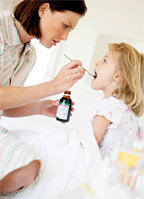 |
 |
|
|
Health Articles:
Alternative and General Health
Musculoskeletal Health
Nutrition and Herbs
Pediatric Health
Senior Health
Sports & Fitness
Women's Health
Ask A Doctor (Forum)
|
By Editorial Staff Mary Rimsza of the University of Arizona College of Medicine and Susan Newberry of the Arizona Child Fatality Review Program, Arizona Department of Health Services, reviewed the data of all unexpected infant deaths in Arizona over a one-year period. The researchers then estimated total national deaths attributable to decongestants, expectorants, antihistamines and cough suppressants. The first strike against cough and cold medicines came in 2006, when guidelines published by the American College of Chest Physicians (ACCP) stated that over-the-counter cough and cold medicines are ineffective in treating the "underlying causes" of cough. The guidelines strongly recommended against the use of such medicines by children ages 14 and younger. At the same time, a review in Respiratory Physiology and Neurobiology attributed the perceived benefit of cold medicines to "the placebo effect," essentially suggesting parents (and their children) feel the medicine is working because they have an underlying assumption it will work.
Adult cold medicines have potential side effects, too, but at least there's some level of research done before dispensing them for public consumption. With the pediatric population, there's little if any research out there (After all, who wants to subject their children to a "test" medicine to see if it's safe?), so there's an underlying - not necessarily correct - assumption that what works in adults works in children. This means children have been receiving cough and cold medicines for years without any real science to support their use. Now science is starting to show they're neither effective nor safe. The FDA is in the process of deliberating whether to extend the ban on cough/cold medicines to children older than age 4; perhaps all the way up to age 11. A decision is expected within months. With up to 500 children dying each year, isn't it about time? After all, three strikes and you're out. Ask your doctor about the dangers of common child medications and potential nondrug alternatives.  |

